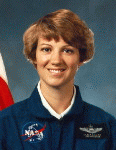Jennifer McCarter
Headquarters, Washington, DC
(Phone: 202/358-1639)
Eileen Hawley/James Hartsfield
Johnson Space Center, Houston, TX
(Phone: 281/483-5111)

Astronaut Eileen Collins (Lt. Col., USAF) will become the first woman to command a Space Shuttle when Columbia launches on the STS-93 mission in December 1998. First Lady Hillary Rodham Clinton made the announcement today in the Roosevelt Room at the White House.
Collins will be joined on the flight deck by Pilot Jeffrey S. Ashby (Cmdr., USN) and Mission Specialists Steven A. Hawley, Ph.D., and Catherine G. "Cady" Coleman, Ph.D (Major, USAF). CNES Astronaut Michel Tognini (Col., French Air Force) was named to the crew on November 12.
Selected as an astronaut in 1990, Collins has served as a pilot on her two previous space flights. Her first space flight was STS-63 in February 1995 as Discovery approached to within 30 feet of Mir, in a dress rehearsal for the first Shuttle/Mir docking. In May 1997, she visited the Mir space station as pilot on board Atlantis for the sixth Shuttle/Mir docking mission, delivering Astronaut Mike Foale and returning Jerry Linenger to Earth.
STS-93 will be the first flight for Ashby. Hawley will be making his fifth space flight during STS-93, having flown previously on STS-41D in 1984, STS-61C in 1986, STS-31 in 1990 and STS-82 in 1997. Coleman has one previous space flight to her credit, having flown on STS-73, the second United States Microgravity Laboratory mission in October/November 1995. Tognini, who spent 14 days on the Mir space station in 1992, will be making his first Shuttle flight on STS-93.
During the five-day mission, the crew will deploy the Advanced X-ray Astrophysics Facility Imaging System (AXAF), which will conduct comprehensive studies of the universe. AXAF will be the most advanced X-ray telescope ever flown. When scientists begin using AXAF next year, they will finally be able to unlock the secrets of some of the most distant, powerful and violent objects known to exist in the universe. They will study such exotic phenomena as exploding stars called supernovae, strange powerful objects called quasars, and mysterious black holes which are so massive that everything near them is pulled inside causing an explosion of X-rays that AXAF can study.
For additional information on the STS-93 crew, or any astronaut, see the NASA Internet biography home page.